
Asleep at the Wheel is an American country music group that was formed in Paw Paw, West Virginia, and is based in Austin, Texas. The band has won nine Grammy Awards since their 1970 inception, released over twenty albums, and has charted more than 21 singles on the Billboard country charts. Their highest-charting single, "The Letter That Johnny Walker Read", peaked at No. 10 in 1975.
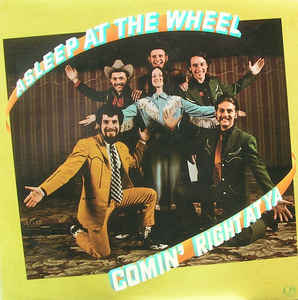
Comin' Right at Ya is the debut album by American western swing band Asleep at the Wheel. Produced by Tommy Allsup at Mercury Custom Studios in Nashville, Tennessee, it was released in March 1973 as the group's only album on United Artists Records. The album features a variety of traditional and original compositions, including recordings of songs originally by Bob Wills, Hank Williams and Geoff Mack. Most of the original tracks on the album were written by drummer and vocalist LeRoy Preston.

Asleep at the Wheel is the second album by American western swing band Asleep at the Wheel. Produced by Norro Wilson at Columbia Recording Studios in Nashville, Tennessee, it was released in September 1974 as the group's first album on Epic Records. As with its predecessor Comin' Right at Ya, Asleep at the Wheel's self-titled album featured a mix of traditional and original compositions, including songs written by popular country musicians Rex Griffin, Cindy Walker and Hank Penny.
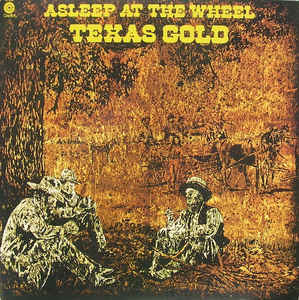
Texas Gold is the third album by American country band Asleep at the Wheel. Produced by Tommy Allsup primarily at Jack Clement Studios in Nashville, Tennessee, it was released in August 1975 as the group's first album on Capitol Nashville. The album was the band's first commercial success, charting on the US Billboard 200 and reaching the top ten of the Top Country Albums chart. Lead single "The Letter That Johnny Walker Read" also reached the Hot Country Songs top ten.
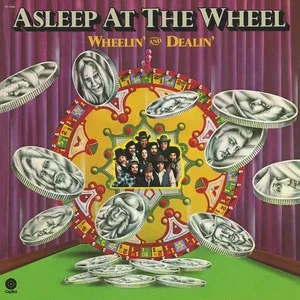
Wheelin' and Dealin' is the fourth album by American western swing band Asleep at the Wheel. Produced by Tommy Allsup at Woodland Sound Studio in Nashville, Tennessee, it was released in July 1976 as the group's second album on Capitol Nashville. It is the band's first album to feature a second fiddler, Bill Mabry, as well as saxophonist Link Davis Jr. The album was a commercial success, charting on the US Billboard 200 and reaching the top 20 of the Top Country Albums chart.

The Wheel is the fifth album by American western swing band Asleep at the Wheel. Produced by Tommy Allsup at Sumet-Bernet Studios in Dallas, Texas, it was released on March 14, 1977 as the group's third album on Capitol Nashville. Unlike the band's previous releases, all of which included covers of songs originally recorded by popular country and jazz artists, The Wheel features entirely original material, most of which was written by band member LeRoy Preston.

Collision Course is the sixth album by American country band Asleep at the Wheel. Produced by Joel Dorn at Regent Sound Studios in New York City, it was released in June 1978 as the group's fourth and final studio album on Capitol Nashville. After 1977's The Wheel featured all original material, Collision Course features only two tracks written by members of the band. The remaining recordings are covers of compositions originally by popular Western swing, Cajun and jazz artists.
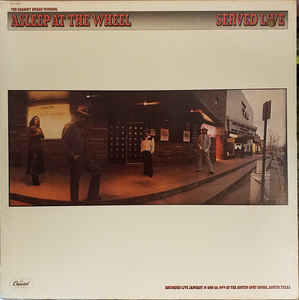
Served Live is the first live album by American country band Asleep at the Wheel. Recorded over two nights at the Austin Opry House in Austin, Texas in January 1979, it was produced by the band's frontman Ray Benson with Chuck Flood, and released on June 11, 1979 as the group's final album on Capitol Nashville. Neither the album nor its sole single, "Choo Choo Ch'Boogie", registered on the US Billboard record charts – the band's first album since 1974 not to do so.

Pasture Prime is the eighth studio album by American western swing band Asleep at the Wheel. Produced by Ray Benson at Austin Recording and Bee Creek Studios in Austin, Texas, and by Benson and Willie Nelson at Pedernales Recording Studio in Briarcliff, Texas, it was released in April 1985 by Demon Music Group in the UK and Stony Plain Records in Canada. The album was later repackaged in the US with three fewer tracks and released under the title Asleep at the Wheel.

10 is the ninth studio album by American western swing band Asleep at the Wheel. Recorded at Bee Creek Studios in Spicewood, Texas and the Austin Recording Studio in Austin, Texas, it was produced solely by the band's frontman Ray Benson and released in March 1987 as the group's first album back on Epic Records. 10 was the group's first album on a major label since 1980's Framed, and its first to register on the US Billboard charts since 1978's Wheelin' and Dealin'.

Western Standard Time is the tenth studio album by American country band Asleep at the Wheel. Recorded at various studios in Austin, Dallas, Briarcliff and San Marcos, Texas it was produced solely by the band's frontman Ray Benson and released in August 1988 as the group's second album back on Epic Records. Western Standard Time is the band's first album to feature no original material, relying on recordings of compositions originally by popular swing, R&B and big band artists.
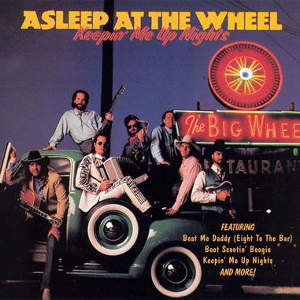
Keepin' Me Up Nights is the 11th studio album by American western swing band Asleep at the Wheel. Recorded primarily in Nashville, Tennessee, it was produced by the band's frontman Ray Benson with Barry Beckett, Tim DuBois and Scott Hendricks, and released in July 1990 as the group's first album on Arista Records. Unlike its 1988 predecessor Western Standard Time, Keepin' Me Up Nights features almost all original material, with just one cover version included.

Greatest Hits: Live & Kickin' is the second live album by American country band Asleep at the Wheel. Recorded on August 9, 1991, at the 30th annual Austin Aqua Festival, which was held at Auditorium Shores in Austin, Texas, it was produced by the band's frontman Ray Benson and released on March 24, 1992, as the group's second and final album on Arista Records. The album was supported by the release of "(Get Your Kicks on) Route 66" as its one single.

Tribute to the Music of Bob Wills and the Texas Playboys is the 12th studio album and first tribute album by American country band Asleep at the Wheel. Recorded at studios in Austin, Texas, and Nashville, Tennessee, it was produced by the band's frontman Ray Benson and released on October 25, 1993, by Liberty Records. The collection features recordings of songs made popular by Western swing group Bob Wills and His Texas Playboys, a major influence on Asleep at the Wheel.

The Wheel Keeps on Rollin' is the 13th studio album by American country band Asleep at the Wheel. Recorded at studios in Austin, Texas, and Nashville, Tennessee, it was produced by Andy Byrd with the band's frontman Ray Benson and released on November 21, 1995, by Capitol Nashville. The album was produced to mark the 25th anniversary of the group's 1970 inception, and was its first collection of new original studio material since the release of Keepin' Me Up Nights in 1990.

Back to the Future Now: Live at Arizona Charlie's, Las Vegas is the third live album by American country band Asleep at the Wheel. Recorded on December 6 and 7, 1996, at Arizona Charlie's Decatur in Las Vegas, it was produced by the band's frontman Ray Benson with Blake Chancey and released on May 20, 1997, by Sony Music imprint Lucky Dog. The album did not chart, spawned no single releases, and received mixed reviews from critics.
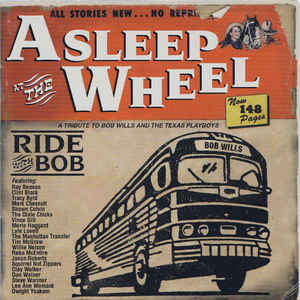
Ride with Bob: A Tribute to Bob Wills and the Texas Playboys is the 15th studio album and second tribute album by American country band Asleep at the Wheel. Recorded between June 1998 and March 1999 at studios in Austin, Texas, and Nashville, Tennessee, it was produced by the band's frontman Ray Benson and released on August 10, 1999, as the band's only album on DreamWorks Records. The album is another tribute to the music of Bob Wills and His Texas Playboys.

The Very Best of Asleep at the Wheel is the 16th studio album by American country band Asleep at the Wheel. Recorded at Bismeaux Studio in Austin, Texas and Bradley's Barn in Nashville, Tennessee, it was produced by the band's frontman Ray Benson and released on June 5, 2001, by Relentless Nashville, an imprint of Madacy Entertainment Group. The album was issued in the United Kingdom in 2003 by Evangeline Records under the title Take Me Back to Tulsa.

The discography of Asleep at the Wheel (AATW), an American country band, consists of 26 studio albums, 16 live albums, 21 compilation albums, seven extended plays (EPs), 40 singles, four video albums and 19 music videos.



















